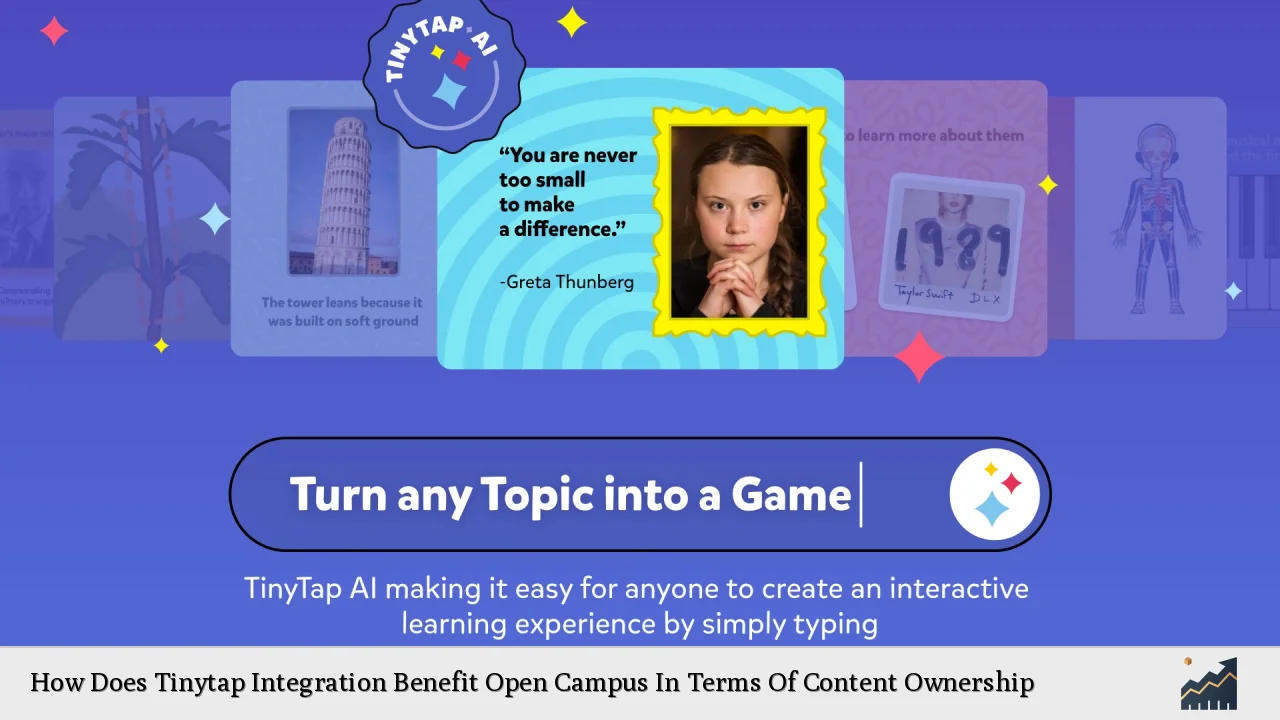The integration of TinyTap with Open Campus represents a transformative shift in the educational landscape, particularly concerning content ownership and monetization. TinyTap, a leading platform for user-generated educational content, leverages blockchain technology to empower educators and learners by providing them with ownership rights over their creations. This partnership not only enhances the accessibility and quality of educational resources but also fosters a decentralized model that prioritizes creator autonomy and financial rewards.
| Key Concept | Description/Impact |
|---|---|
| Content Ownership | TinyTap enables educators to maintain control over their intellectual property through Publisher NFTs, ensuring they receive fair compensation for their work. |
| Decentralization | The collaboration promotes a decentralized education model, reducing reliance on traditional institutions and intermediaries. |
| Revenue Sharing | Smart contracts facilitate transparent revenue sharing among creators, co-publishers, and the platform, enhancing financial incentives for quality content creation. |
| Market Accessibility | The integration broadens access to educational materials, allowing creators to reach a global audience without geographical limitations. |
| Innovative Learning Tools | TinyTap’s AI features enhance content creation, enabling personalized learning experiences that cater to diverse student needs. |
| Community Engagement | The partnership fosters a collaborative environment where educators can share resources and best practices, enhancing overall educational quality. |
Market Analysis and Trends
The education technology (EdTech) market is experiencing rapid growth, projected to expand from USD 169.37 billion in 2024 to USD 598.82 billion by 2032, with a compound annual growth rate (CAGR) of 17.10% during this period. This growth is driven by increasing investments in digital learning tools and the rising demand for personalized education solutions.
The integration of blockchain technology into education through platforms like Open Campus is part of a broader trend towards decentralization in various sectors. By leveraging blockchain, Open Campus ensures transparency in content ownership and revenue distribution, which is crucial in an industry often criticized for its inequitable compensation models.
Implementation Strategies
To maximize the benefits of the TinyTap and Open Campus integration, several strategies can be implemented:
- Adoption of Publisher NFTs: Educators can mint their content as NFTs, allowing them to retain ownership and earn revenue directly from their creations without intermediaries.
- Utilization of Smart Contracts: These contracts automate revenue sharing based on predefined criteria, ensuring that all contributors are compensated fairly and transparently.
- AI-Driven Content Creation: TinyTap’s AI capabilities enable rapid development of engaging educational materials tailored to individual learning needs, enhancing user engagement.
- Community Building Initiatives: Encouraging collaboration among educators through forums and shared resources can foster innovation and improve the quality of educational content available on the platform.
Risk Considerations
While the integration presents numerous opportunities, several risks must be considered:
- Security Vulnerabilities: As with any blockchain project, there are inherent risks related to security breaches that could compromise user data or intellectual property.
- Market Volatility: The value of tokens used within the Open Campus ecosystem may fluctuate significantly, impacting creators’ earnings.
- Regulatory Challenges: Navigating the evolving regulatory landscape surrounding blockchain and cryptocurrency can pose challenges for both TinyTap and Open Campus.
Regulatory Aspects
The integration of TinyTap with Open Campus must comply with various regulatory frameworks governing digital content and cryptocurrencies. Key considerations include:
- Intellectual Property Rights: Ensuring that all content created using TinyTap’s platform adheres to copyright laws and respects the rights of original creators.
- Data Protection Regulations: Compliance with data privacy laws such as GDPR is essential when handling user information on blockchain platforms.
- Cryptocurrency Regulations: Understanding how different jurisdictions regulate cryptocurrencies will be vital for the successful implementation of token-based transactions within the platform.
Future Outlook
The future of education technology looks promising as platforms like TinyTap and Open Campus continue to innovate. With an increasing emphasis on personalized learning experiences facilitated by AI and blockchain technology, we can expect:
- Enhanced Learning Experiences: The ability to create customized educational tools will likely lead to more engaging learning environments.
- Greater Financial Independence for Educators: As creators gain more control over their content and earnings through NFTs and smart contracts, we may see a shift in how educational resources are produced and consumed.
- Expansion into Global Markets: The decentralized nature of these platforms allows for broader access to quality education across diverse regions, potentially transforming educational landscapes worldwide.
Frequently Asked Questions About How Does Tinytap Integration Benefit Open Campus In Terms Of Content Ownership
- What are Publisher NFTs?
Publisher NFTs are non-fungible tokens that allow educators to tokenize their content, maintaining ownership while earning revenue from sales or usage. - How does blockchain enhance transparency?
Blockchain technology provides an immutable record of transactions related to content ownership and revenue sharing, ensuring all parties can verify contributions. - Can anyone create content on TinyTap?
Yes, TinyTap allows educators from various backgrounds to create interactive learning materials using its no-code platform. - What role does AI play in this integration?
AI enhances content creation by enabling personalized learning experiences and automating routine tasks for educators. - Are there risks associated with using Publisher NFTs?
Yes, risks include potential security vulnerabilities and fluctuations in token value impacting earnings. - How does this integration affect traditional education systems?
The integration promotes a decentralized approach that empowers educators beyond traditional institutional constraints. - What future developments can we expect?
Future developments may include enhanced AI features for personalized learning and broader adoption of blockchain solutions in education. - Is professional advice recommended when investing in EdTech?
Yes, due diligence is essential when considering investments in emerging technologies like EdTech platforms.
In conclusion, the integration of TinyTap with Open Campus significantly benefits content ownership by empowering educators through innovative tools that enhance their ability to create, distribute, and monetize educational resources. This partnership not only fosters a decentralized approach but also aligns with current market trends emphasizing transparency and creator autonomy. As the EdTech landscape continues to evolve, such integrations will likely play a crucial role in shaping the future of education.

